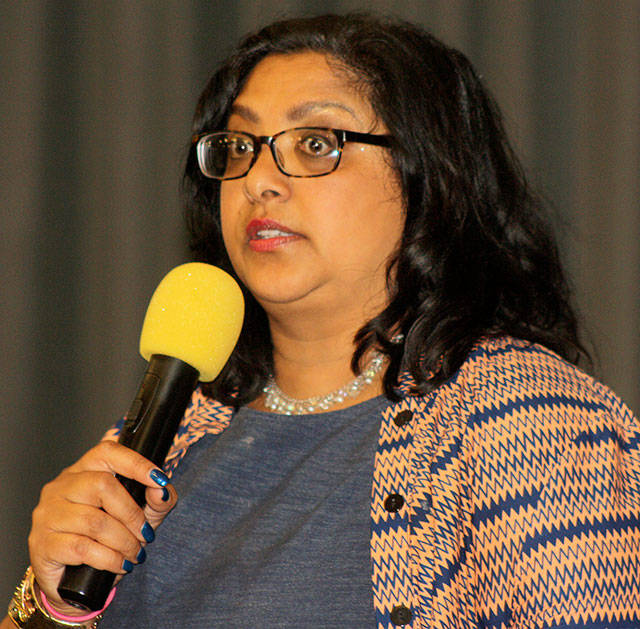A state Senate inquiry in Olympia found no evidence that Democratic lawmakers made sexist or racist statements during caucus meetings last session, as alleged in June by Kent Sen. Mona Das.
“It was gratifying but not surprising that the investigator found no incidents of racism or sexism in our caucus room,” Senate Majority Leader Andy Billig, D-Spokane, said in a statement on Monday about the eight-page inquiry released by Secretary of the Senate Brad Hendrickson. “Those are not reflective of the values of the Senate Democratic Caucus. In fact, we have worked hard to elevate marginalized voices and to pass policies that work to address institutional bias.”
Das claimed at a Kent Chamber of Commerce luncheon on June 20 that her first year in the Senate included closed-door meetings that were full of “racism, sexism and misogyny.”
After an article in the Kent Reporter described the comments by Das, Hendrickson requested an investigation into the allegations by Das under the Senate’s policy on appropriate workplace conduct.
Tara Parker, Senate human resources officer, conducted the investigation to find out if any other senators heard racist or sexist remarks. Parker noted that she spent approximately 30 hours in conversations with 12 Democratic Caucus members, two Republican Caucus members and three members of the House.
While Parker found no sexist or racist comments were made, she also concluded, “there is broad agreement in the Democratic Caucus that institutional and unconscious bias are problems that need to be addressed in the Senate and in every institution.”
After Associated Press picked up the Kent Reporter story, Das initially claimed the newspaper mischaracterized her remarks. When a video of the Chamber event showed the quotes were accurate and the Kent Reporter didn’t mischaracterize her comments, Das apologized for claiming the paper got it wrong.
Das then referred to the comments she heard as “coded language.” She did not specify the language she found offensive nor whom she alleged had used such language. Das did not file a formal compliant with the Senate.
“Institutional racism affects the lives of people throughout our state through policies, laws and the actions of others,” Das said in a statement Monday after the report’s release. “While this bias is often unconscious and unintentional, it still has a profound effect on people who have been historically marginalized, and it should be taken seriously.”
Parker said she spoke at length with Das about her statements at the Chamber meeting, according to the inquiry. Das said she regretted the language she used conveyed something quite different than what she had in mind. She said she did not mean to suggest that her fellow caucus members used overtly racist and sexist terms and expressions.
Instead, Das was referring to “a few” colleagues who were purportedly dismissive and disrespectful when members of color raised concerns that specific legislation could disproportionately impact communities of color. She declined to name those members.
Several senators, including members of color, said they were “very dismayed” by Das’ statements before the Chamber, according to the report. They were upset because of her assertion that members said sexist and racist things in the caucus room was, “untrue and disparaging.” They also felt her reference to caucus room debates was a breach of professional trust that may inhibit open and candid exchanges moving forward.
Das told Parker that it was common for senior members to tell new members that they should generally refrain from speaking in caucus. She said this was conveyed as intended to help new members “listen and learn.” Das explained that she felt like it created a culture where voices like hers, and the perspectives of the marginalized people who had not had legislative representation, were “silenced.”
Das, who was born in India and immigrated to the United States with her family at just 8 months old, said in her statement released Monday she plans to continue to work for people of color to make sure certain issues are addressed.
“I hope to be an advocate for people who traditionally haven’t had a place in our government and other positions of power,” Das said. “I’m proud to be a member of the most diverse Legislature that has served Washington to date, and I look forward to working with my colleagues to address institutional racism in our government and throughout Washington.”
Billig said biases need to be addressed.
“I am proud of our record on these issues, but we can always do more,” Billig said. “As the report states, institutional biases exist in the Legislature as they exist in most institutions. It is our job to continue to move the Legislature forward and foster an environment that ensures all voices are heard. The report also highlights the diversity of our caucus and within our leadership team in particular. We are uniquely positioned as a caucus to be leaders for the Legislature and our entire state on issues of racism and fostering a respectful workplace.”



